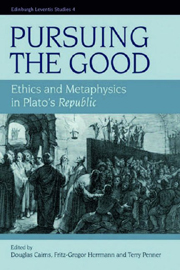Book contents
- Frontmatter
- Contents
- Preface
- Contributors and Editors
- Introduction
- 1 What is the Form of the Good the Form of? A Question about the Plot of the Republic
- 2 Glaucon's Challenge, Rational Egoism and Ordinary Morality
- 3 Thrasymachean Rulers, Altruistic Rulers and Socratic Rulers
- 4 Neutralism in Book I of the Republic
- 5 The Good, Advantage, Happiness and the Form of the Good: How Continuous with Socratic Ethics is Platonic Ethics?
- 6 The Form of the Good and the Good in Plato's Republic
- 7 Flourishing: The Central Concept of Practical Thought
- 8 Is Plato's Conception of the Form of the Good Contradictory?
- 9 The Good, Essences and Relations
- 10 The Idea of the Good and the Other Forms in Plato's Republic
- 11 The Aporia in the Charmides about Reflexive Knowledge and the Contribution to its Solution in the Sun Analogy of the Republic
- 12 The Good and Mathematics
- 13 The Good and Order: Does the Republic Display an Analogy Between a Science of Ethics and Mathematics?
- 14 Inquiry and Justification in the Search for the Highest Good in Plato and Aristotle
- 15 The Carpenter and the Good
- 16 Conversion or Conversation? A Note on Plato's Philosophical Methods
- Index
12 - The Good and Mathematics
Published online by Cambridge University Press: 12 September 2012
- Frontmatter
- Contents
- Preface
- Contributors and Editors
- Introduction
- 1 What is the Form of the Good the Form of? A Question about the Plot of the Republic
- 2 Glaucon's Challenge, Rational Egoism and Ordinary Morality
- 3 Thrasymachean Rulers, Altruistic Rulers and Socratic Rulers
- 4 Neutralism in Book I of the Republic
- 5 The Good, Advantage, Happiness and the Form of the Good: How Continuous with Socratic Ethics is Platonic Ethics?
- 6 The Form of the Good and the Good in Plato's Republic
- 7 Flourishing: The Central Concept of Practical Thought
- 8 Is Plato's Conception of the Form of the Good Contradictory?
- 9 The Good, Essences and Relations
- 10 The Idea of the Good and the Other Forms in Plato's Republic
- 11 The Aporia in the Charmides about Reflexive Knowledge and the Contribution to its Solution in the Sun Analogy of the Republic
- 12 The Good and Mathematics
- 13 The Good and Order: Does the Republic Display an Analogy Between a Science of Ethics and Mathematics?
- 14 Inquiry and Justification in the Search for the Highest Good in Plato and Aristotle
- 15 The Carpenter and the Good
- 16 Conversion or Conversation? A Note on Plato's Philosophical Methods
- Index
Summary
SCYLLA AND CHARYBDIS
I begin by citing two important pieces of evidence for Plato's thinking about mathematics and the good, both based on Plato's (or Platonic) unwritten teachings. The relevance of this evidence for understanding Plato's dialogues, especially the Republic, is brought out later. The first item is a report of Plato's famous lecture on the good, given in the Academy:
Everyone came expecting they would acquire one of the sorts of thing people normally regard as good, on a par with wealth, good health or strength. In sum, they came looking for some wonderful kind of happiness. But when the discussion turned out to be about mathematics, about numbers and geometry and astronomy, and then, to cap it all, he claimed that Good is One (kai to peras hoti agathon estin hen), it seemed to them, I imagine, something utterly paradoxical. The result was that some of them sneered at the lecture, and others were full of reproaches. (Aristoxenus, Elementa Harmonica 2.1, p. 30.20–31.2 Meibom)
The second item is a comment by Aristotle responding to discussions in the Academy:
They [members of the Academy] ought in fact to demonstrate [the nature of] the Good itself in the opposite way to the way they do it now. At present, they begin with things that are not agreed to have goodness and proceed to show the goodness of things which are agreed to be goods. For example, starting from numbers they show that justice and health are goods, on the grounds that justice and health are types of order (taxeis) and numbers (arithmoi), while numbers and units possess goodness because unity is the Good itself (dia to einai to hen auto to agathon). They ought rather to start from agreed goods such as health, strength, temperance, and argue that the beautiful is present even more in unchanging things, which are all examples of order (taxis) and stability (êremia). Then, if the former are goods, a fortiori the latter must be goods, because they have order and stability to a greater degree. (Aristotle, Eudemian Ethics 1.8, 1218a15–24) 1
- Type
- Chapter
- Information
- Pursuing the GoodEthics and Metaphysics in Plato's Republic, pp. 251 - 274Publisher: Edinburgh University PressPrint publication year: 2007



